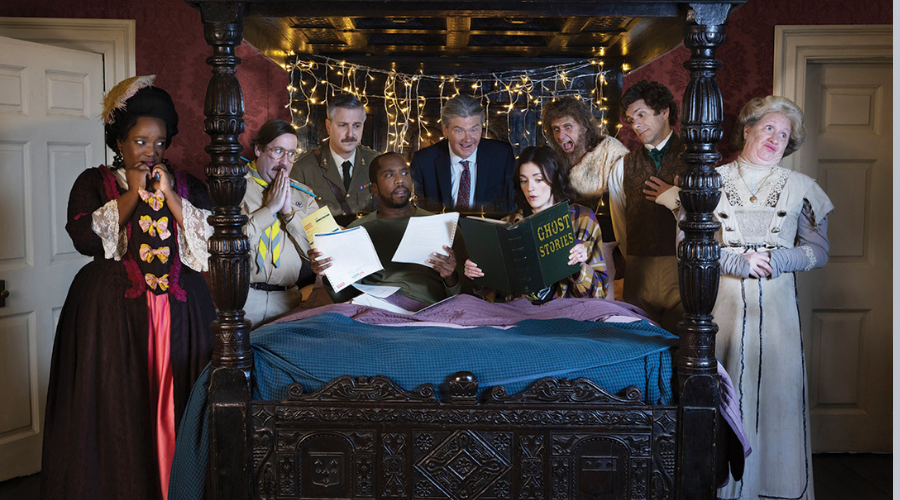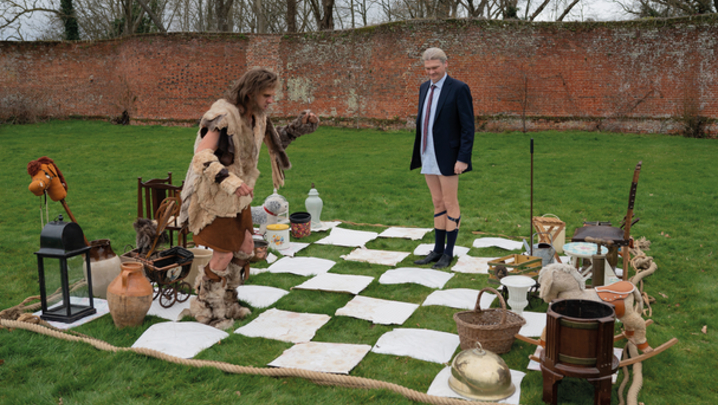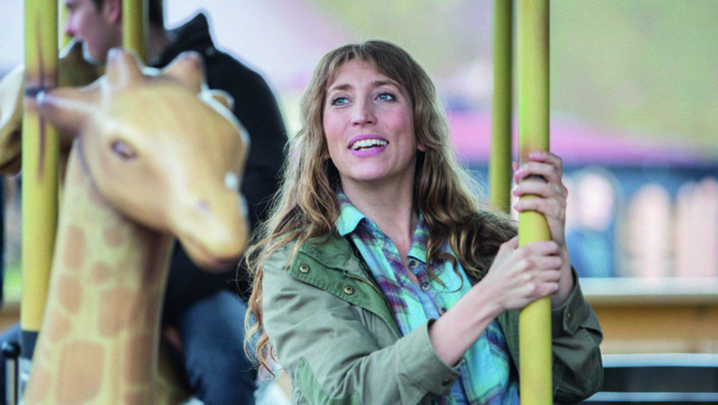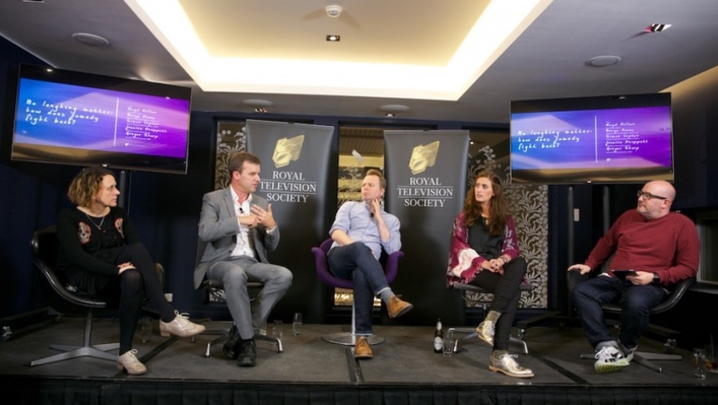Shilpa Ganatra interviews Mathew Baynton, who explains why it’s time to end the BBC One sitcom and how new voices are improving TV comedy
What have we done?” bemoans the decapitated head of Sir Humphrey Bone, after the nation’s favourite spectres make a defining decision in the final episode of Ghosts, which goes out as a Christmas special on BBC One. “We did the right thing,” Julian Fawcett, the trouserless MP ghost, says confidently.
The exchange nicely reflects the sentiment of the show’s creators, the Them There collective, in deciding to exorcise the BBC supernatural sitcom after five series – despite notching up several RTS nominations and maintaining an audience of around 4 million throughout its run.
The Christmas special was co-written by Them There’s Mathew Baynton, who also plays the romantic poet Thomas Thorne in the series.
“From an artistic point of view, I’ve never been in any doubt that ending Ghosts now was the right thing to do and the right time to do it,” he tells Television. “From a personal point of view, we feel a sense of loss that we’re not going to be getting together in that place at the same time of year, every year. But nothing can go on for ever.
“That sadness tells you it was the right thing. If we carried on for another five seasons and we were all bored of it, bored of each other, and it wasn’t as good as it used to be, we wouldn’t miss it afterwards.”
The series follows in the tradition of British domestic sitcoms, centring on a young couple, Alison and Mike (Charlotte Ritchie and Kiell Smith-Bynoe). They inherit Button House, a country manor haunted by a disparate crew of spirits from across the ages, played by the Them There collective: Baynton, Simon Farnaby, Martha Howe-Douglas, Jim Howick, Laurence Rickard and Ben Willbond, plus Lolly Adefope.
The show is a logical leap from the troupe’s first multi-award-winning TV creation, Horrible Histories, which re-enacted the curiosities of yesteryear in comedic skits. Horrible Histories’ success made it “shockingly easy” to get Ghosts commissioned – the only bump in the road was discussions between the group and the BBC about the pilot.
Recalls Baynton: “They wanted to do a pilot that would go out with other pilots. We wanted to do one to figure out the idea and road test the special effects, but we didn’t want it to be aired, because then there would be a pressure to not change it.”
The compromise was to make a 10-minute taster pilot that wasn’t for broadcast. This taster tried out their initial idea of having a house full of different ghosts and playing multiple characters (as with Horrible Histories and Them There’s Sky One series, Yonderland). But the result proved this set-up didn’t create the character friction necessary to sustain a sitcom, so the band stuck to the small group of ghosts we know today, from a prim and proper Edwardian matriarch to a caveman.
“In an ideal world, you’d pilot anything that you do, because it can be so valuable to be able to change it,” reflects Baynton. “But channels don’t necessarily have bottomless pockets.”
As Ghosts meets its end – on British TV at least, as the US adaptation is still going strong and about to enter its third season – Baynton, who turns in a high-octane performance as Fickelgruber in the film Wonka, is turning his attention to the other strings in his bow.
At the end of January he’ll step into the role of Bottom in a new production of A Midsummer Night’s Dream by the Royal Shakespeare Company.
He’s also writing a comedy film (details are being kept under wraps) and will show off his more serious acting side in the upcoming BBC Three series A Good Girl’s Guide to Murder, a crime thriller based on the bestselling novel.
As a student, Baynton initially studied directing, earning a first-class degree at the Rose Bruford drama school in south-east London. After being drawn towards comedy, he attended Philippe Gaulier’s famously idiosyncratic clown school in Paris. “We used to say half of the fee is like a ticket just to watch him, because he’s hilarious. He plays the persona of a curmudgeonly, philosophical, French sort of half-wizard,” he recalls, adding: “Philippe’s got an incredible ability to help you learn what the audience sees in you.
“If people tried to act up an idiot character, he’d say, ‘Don’t pretend to be more of an idiot than God already made you. He did a good enough job’. You don’t need to exaggerate it or pretend to look stupid. What you need to be is honest about the thing about yourself that people find funny, and then access that and allow people to laugh at it.”
This advice helped Baynton climb his first rungs in TV comedy to play Deano in Gavin & Stacey, a work colleague of Smithy (James Corden). He would go on to co-create and write the RTS award-winning The Wrong Mans with Corden, the co-author of Gavin & Stacey. By the time Ghosts began, he had worked in TV comedy – featuring in Peep Show, Spy and The Armstrong and Miller Show, among others – for more than a decade.
“You’ll hear people saying, ‘Comedy was best when I was young’. I always think, ‘Well, you’re just not paying attention, then’. There will always be great stuff and if it doesn’t speak to you, it’s probably because it’s for people younger than you.”
While being a dad of two has limited the amount of competitor benchmarking he’s doing, he’s impressed with the greater breadth of voices in contemporary TV comedies.
“Bridget Christie’s The Change springs to mind, with menopausal women as the central characters, and the specificity of the location of the Forest of Dean. You couldn’t say that’s like any sitcom that’s come before,” he says. “We Are Lady Parts is another one, so is Stath Lets Flats.
“I don’t know why I’m only naming Channel 4 shows, seeing as the BBC has been so good to me…”
Making comedy inclusive is no constraint to a writer, Baynton believes: “I’ve read the odd interview where people have said that creators are self-censoring to the point where they can’t be as instinctively funny. And some people see comedy’s function as being able to say the unsayable.
“I can only speak for myself, but I know that my best work comes from writing and rewriting. What emerges is always something cleverer than I am, because in life you only get a first draft when you’re having a conversation. It’s not a bad thing to realise that a joke could maybe hurt someone, and it sounds like a better idea that I should rewrite if my intention could be misconstrued.”
As the curtain falls on Ghosts, commissioners are clamouring to find out what’s next for the Them There collective. Happily, they still have the same personnel and are mulling over their next project.
“We’re mindful that we can’t just do a modern sitcom where we’re wearing jeans and T-shirts. It just isn’t our tone,” says Baynton. “When we look for ideas, we’re thinking, what’s the playground that we can put ourselves in? Where we can do something with a heightened silliness, where potentially we play more than one character, and where there is a costume element to it.”
With this tried and tested formula as the base, their continued success seems assured. The legacy of Ghosts is preserved, too, persisting in the corridors of Button House and, indeed, TV history.







